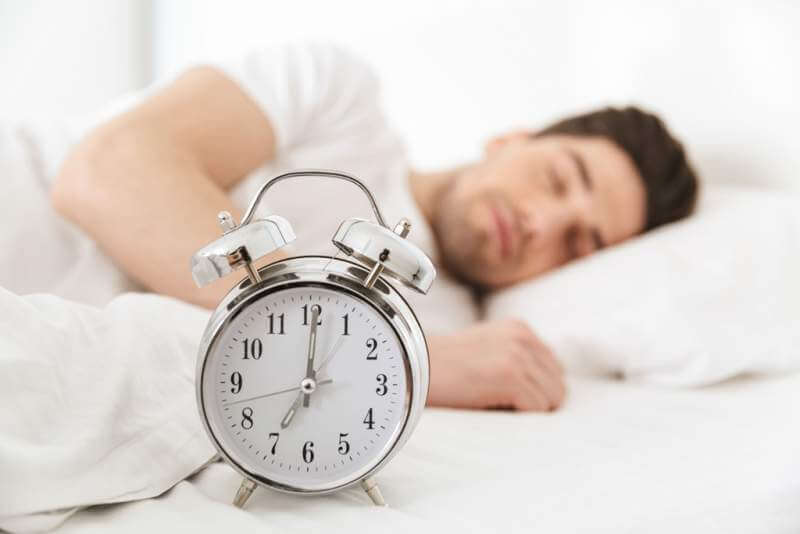Sleeping is incredibly important for our lives, and when the quality of our sleep is poor, our bodies and minds are also going to suffer. Unfortunately, more and more people are neglecting the importance of the REM phase, which is the sleep stage during which our bodies really rest. We are simply not ready for the changes modern life brings us. Despite all the modern advances and lifestyle changes that come with it, we are still biologically programmed to go to bed by 11pm. However, for some, that’s very difficult, if not outright impossible; if you are one of them, here is what YOU can do to improve the quality of your sleep.
1. Increase your daily exposure to bright light
 Have you ever heard of the circadian rhythm? Basically, it’s our natural time-keeping clock that affects our hormones, brain and the whole body. It helps us stay awake and tells our body when it is time to go to sleep.
Have you ever heard of the circadian rhythm? Basically, it’s our natural time-keeping clock that affects our hormones, brain and the whole body. It helps us stay awake and tells our body when it is time to go to sleep.
Sunlight is what keeps our circadian rhythm healthy and improves the duration and quality of our nights’ sleep.
So, try to catch as much sun as you can on a daily basis, and maybe even consider incorporating artificial bright light devices into your home.
2. Reduce the blue light during night time
 Even though light is desirable during the day, we should strive to minimize it during the night. To put it simply, it tricks your brain into thinking it is still daytime, which reduces the production of melatonin – the hormone that helps us relax.
Even though light is desirable during the day, we should strive to minimize it during the night. To put it simply, it tricks your brain into thinking it is still daytime, which reduces the production of melatonin – the hormone that helps us relax.
Blue light is the light emitted by electronic devices such as computers, TVs and smartphones. And let me just say – this light is the worst.
You can reduce your nighttime blue light exposure by wearing glasses that block it, by installing an app that blocks it on your computer and smartphone, and by simply not using these devices at least 2 hours before going to bed.
3. Ditch the caffeine
 Calm down, no is saying you can’t have your cup of delicious morning coffee, but let’s make sure it’s the only one.
Calm down, no is saying you can’t have your cup of delicious morning coffee, but let’s make sure it’s the only one.
When you consume caffeine late in the day, it can stimulate your nervous system and prevent your body from relaxing. After all, coffee jolts you awake, it doesn’t put you to sleep, right?
It stays in your body for up to 8 hours, so drinking coffee after 4pm is not desirable if you have troubles falling asleep.
And if you crave coffee during later periods of the day, grab a cup of decaf rather than regular – they taste the same after all.
4. No long day-naps
 Naps are beneficial – but only those short, 30-minute power naps. The ones that make you wonder in which dimension you are in when you wake up are not good for you nor for the quality or quantity of your nights’ sleep.
Naps are beneficial – but only those short, 30-minute power naps. The ones that make you wonder in which dimension you are in when you wake up are not good for you nor for the quality or quantity of your nights’ sleep.
5. Consistency is key
 Our body likes rules and routines. And being consistent in terms of sleeping and waking up times can be quite beneficial in the long run when it comes to sleep quality. In other words, try going to bed at similar times every night; that should lead to a consistent sleep schedule that will leave you rested and awake at the same time every morning. It may be hard at first, but after a couple of weeks, you won’t even need the alarm.
Our body likes rules and routines. And being consistent in terms of sleeping and waking up times can be quite beneficial in the long run when it comes to sleep quality. In other words, try going to bed at similar times every night; that should lead to a consistent sleep schedule that will leave you rested and awake at the same time every morning. It may be hard at first, but after a couple of weeks, you won’t even need the alarm.
6. Consider supplements
 The first supplement you should consider is melatonin as they are really popular sleep aids. Start off with a low dose and slowly increase it if needed. However, don’t do anything on your own and consult your doctor first.
The first supplement you should consider is melatonin as they are really popular sleep aids. Start off with a low dose and slowly increase it if needed. However, don’t do anything on your own and consult your doctor first.
If melatonin is not for you, there are other supplements that induce relaxation and they include ginkgo biloba – which is a natural herb that has many other benefits besides improving sleep, glycine – an amino acid, valerian root, magnesium, L-theanine, and lavender.
7. Optimize your bedroom
 Your bedroom is your kingdom and your bed is your throne, and if those are set up the right way, you’ll be able to fall asleep easier. Minimize external noise, ditch the blue light devices and make sure the air is always fresh.
Your bedroom is your kingdom and your bed is your throne, and if those are set up the right way, you’ll be able to fall asleep easier. Minimize external noise, ditch the blue light devices and make sure the air is always fresh.
And speaking of bed, make sure you have a comfortable mattress, a quality pillow and good bedding.
Oh, and remember how I mentioned lavender earlier?Well, consider getting a lavender linen spray and spray it on your pillows to help you enter the dream land even faster.
8. Avoid alcohol
 You may pass out and sleep like a baby after a night of drinking and partying, but alcohol before bed is never a good idea. Not only does it worsen snoring, and exacerbate the symptoms of sleep apnea, it also alters your melatonin production, which disrupts your sleep patterns.
You may pass out and sleep like a baby after a night of drinking and partying, but alcohol before bed is never a good idea. Not only does it worsen snoring, and exacerbate the symptoms of sleep apnea, it also alters your melatonin production, which disrupts your sleep patterns.
9. Don’t eat late in the evening
 Late-night eating can reduce the release of melatonin and human growth hormone (HGH). And not to mention that you can also gain weight if you eat late, so basically you should ditch all your late-night snacks and try to balance your diet and your daily calorie intake so you don’t get hungry during the night.
Late-night eating can reduce the release of melatonin and human growth hormone (HGH). And not to mention that you can also gain weight if you eat late, so basically you should ditch all your late-night snacks and try to balance your diet and your daily calorie intake so you don’t get hungry during the night.
10. Clear your mind
 Consider incorporating a pre-sleep routine before bedtime. Try meditating, listening to relaxing music, taking a bath or reading a book. Find what relaxes you the most and incorporate that into your day.
Consider incorporating a pre-sleep routine before bedtime. Try meditating, listening to relaxing music, taking a bath or reading a book. Find what relaxes you the most and incorporate that into your day.
11. Check with your doctor
 There is a possibility that you may suffer from an underlying health condition and that that is the reason why your sleep suffers. There are many conditions that can affect sleep, from sleep apnea, over sleep movement disorders all the way to circadian rhythm disorders that are common for shift workers. So, visit your doctor and make sure you don’t have any of these, or if you do, start treating them immediately.
There is a possibility that you may suffer from an underlying health condition and that that is the reason why your sleep suffers. There are many conditions that can affect sleep, from sleep apnea, over sleep movement disorders all the way to circadian rhythm disorders that are common for shift workers. So, visit your doctor and make sure you don’t have any of these, or if you do, start treating them immediately.
What do you think about these tips? Did any of these help you improve your sleep? Do you have some more ideas you would like to share with others? Feel free to leave your comment below.
